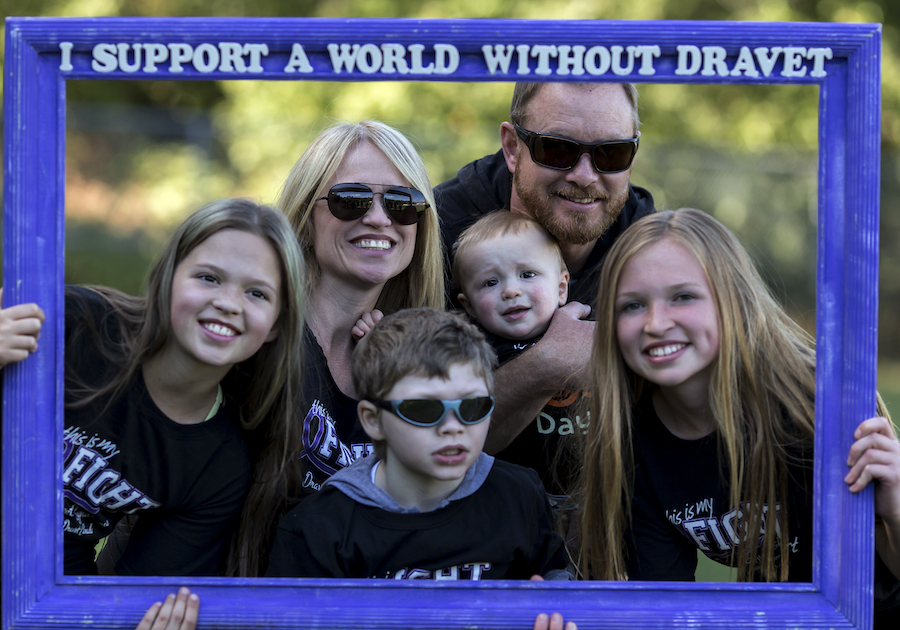Nearly Seizure-Free: How Cannabis Is Helping Epilepsy Patients
Liam McKnight had his first seizure at nine months old. At age two, Liam was diagnosed with Dravet Syndrome, a life-threatening form of epilepsy. On any given day, the Ottawa-based child would endure 50-70 seizures.
“It felt like our life was spiraling out of control,” says his mom, Mandy McKnight. “Simply put my mission in life had become to save Liam’s at any cost.”
Over the course of the next two years, McKnight sought out various treatments for Liam’s seizures. “For many years we listened to the doctor’s advice and tried medication after medication.” Nothing could ease his seizure disorder, and Mandy and Liam’s dad Dave McKnight were willing to explore any options available. At a 2012 conference, Mandy had a chance encounter with a fellow Dravet Syndrome parent, who shared the experience of treating their son with CBD, a non-psychoactive compound found in cannabis and hemp.
Intrigued, McKnight did her research and decided to approach Liam’s neurology team about treating him with cannabis. She says she was immediately shut down.
Dr. Tanny Raz, MD, and director of medical business development at Apollo Applied Research isn’t surprised. “Medical cannabis has most likely been disregarded as a viable treatment option for epileptic patients for two reasons,” says Raz. “There is a lack of current research indicating the efficacy of medical cannabis for seizure treatment, and the medical community has not been taught or exposed to the potential benefits of medical cannabis to treat conditions like seizure disorders.”
But McKnight persisted, eventually finding an Edmonton doctor willing to discuss a treatment plan that included cannabis. A year later, in 2014, Liam was a registered patient with the licensed producer Bedrocan (now a division of Canopy). Finally Liam’s family had obtained high-CBD medicine for him, and it worked, reducing his seizure activity by up to 90 per cent.
Still, Mandy McKnight believes they can do better, and says she’ll continue researching new strains and dosing schedules as more study results become available.

Liam McKnight, centre, pictured with his parents and siblings. Since starting cannabis treatment, Liam has experienced a 90 per cent reduction in seizures.
For Shelley Thiemann of Calgary, the frustration in finding the right medicine is familiar. When she was first diagnosed with generalized idiopathic and refractory epilepsy at the age of 24, Thiemann’s neurologist started her on high-dose anticonvulsants. But after 11 different prescriptions, nothing seemed to be working. “With every change, I had every side effect possible,” she explains. “Eventually, my neurologist told me there wouldn’t be a medication available to treat my type of epilepsy.”
Frustrated, but not defeated, Thiemann started doing her own research. She discovered CBD and found a doctor willing to explore cannabis as a treatment option. Together, they discussed her concerns, medical history and eventually the doctor wrote her a prescription for cannabis. After six months without a single seizure, Thiemann felt like she had a new lease on life. “I hope in the future that the first medication that a doctor will try for epilepsy will be CBD,” she says, explaining how important it is that she finally has her quality of life back.
In recent controlled trials, patients taking 20mg of CBD per kilogram of body weight per day experienced a 50 per cent reduction in seizure frequency when compared to subjects taking a placebo. CBD can be life-changing for epilepsy patients, but that doesn’t mean they can get it easily.
“A large proportion of patients with epilepsy choose to use cannabis oil rich in the compound CBD, also known as CBD oil. However, one of the accessibility issues facing patients, and the market as a whole, is that often the demand for CBD-based products, and CBD oil, in particular, is greater than the supply,” says Raz. She notes that it can take several months to complete the production cycle – from seed to plant to oil to patient – and that supply shortages mean many patients suffer from inconsistent access to their medicine.
For epilepsy patients who are able to access CBD, success is measured in seizure control. When CBD is is drastically reducing – and sometimes eliminating – their seizures, they say it is a much-needed lifeline.
Interested in exploring medical cannabis options for seizures, epilepsy or other conditions? Book a free consultation with a Natural Care prescriber, or call 1-888-671-8022 with your questions.

